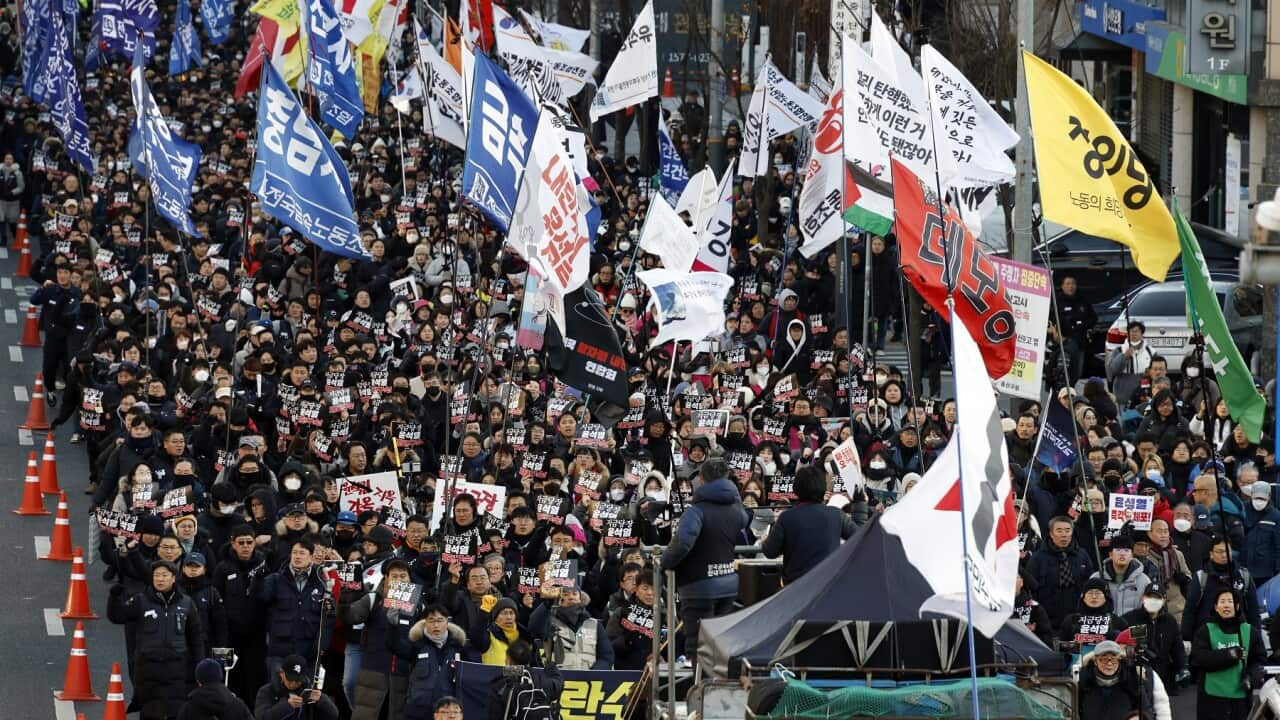TRANSCRIPT
In South Korea's capital Seoul, thousands of protestors are braving freezing temperatures and heavy snow.
Some, like 24-year-old Oh So-Jung, are there to rally for the arrest of suspended President Yoon Suk Yeol.
"I live nearby and even when it snows or when the weather is cold, we need to keep coming here. A place where many people gather will be less cold, right? So, I will keep coming out to rally until the president is impeached.”
Others, like 61-year-old Kim Jung-Soo, have gathered to try and prevent that happening.
"Tomorrow, our patriotic citizens will definitely protect the president. Even if the anti-government forces may extend the arrest warrant, we will stand with President Yoon Suk Yeol until the end and protect our liberal democracy.”
An arrest warrant against Yoon for alleged insurrection will expire at midnight on Monday.
Over the past few days, tensions have increased across the capital as the deadline looms.
On Friday, an attempt to arrest the suspended president failed when a six-hour standoff ended over fears of violence.
His presidential security service had refused police entry while Yoon's supporters created a human wall to prevent access.
The chief of Yoon's security says that decision was made in light of a legal debate surrounding the warrant for Yoon's arrest.
"Although the impeachment motion for President Yoon Seok Yeol has been passed at the National Assembly, Yoon is still the current president of this country who is elected by the sovereign residents of South Korea. And Yoon is receiving the appropriate security service according to that, as stipulated by law."
A Seoul court has rejected a complaint from Yoon's lawyers that the arrest warrant is illegal and invalid, according to a local news agency.
Insurrection is one of a few crimes not subject to presidential immunity, meaning Yoon could be sentenced to prison or, at worst, the death penalty.
If the warrant is executed, Yoon would become the first sitting South Korean president to be arrested.
Anti-Yoon protesters say they want to see that happen quickly to avoid more disruption.
"I believe the arrest warrant for impeached president Yoon Suk-yeol followed the appropriate legal procedures. However, I believe that the reckless disruptions and unlawful actions by Yoon Suk-yeol's supporters pose a serious issue."
South Korea was plunged into chaos last December when Yoon attempted to declare martial law.
It didn't last long - he called it off just hours later in response to national outcry.
Two weeks later, acting President Han Duck-soo was also impeached after being accused of failing to complete Yoon's impeachment.
It's left the new acting President Choi Sang-mok under pressure to order Yoon's security team to cooperate.
But President Yoon's supporters argue he did nothing wrong to start with.
"The declaration of martial law is certainly within the president's authority and is not illegal. Arbitrarily labelling it a rebellion and arresting him for that is illogical."
What happens next is ultimately up to South Korea’s Corruption Investigation Office - which will likely file for a new and stronger warrant after tomorrow.
Meanwhile, US Secretary of State Antony Blinken is visiting South Korea - he'll seek to encourage the continuity of policies, but not tactics, of the impeached president.
The country’s Constitutional Court has the 14th January pencilled in for the start of Yoon’s impeachment trial, that will go ahead with or without him in custody.
The court will have up to 180 days to determine whether to dismiss Yoon as president or restore his powers.













